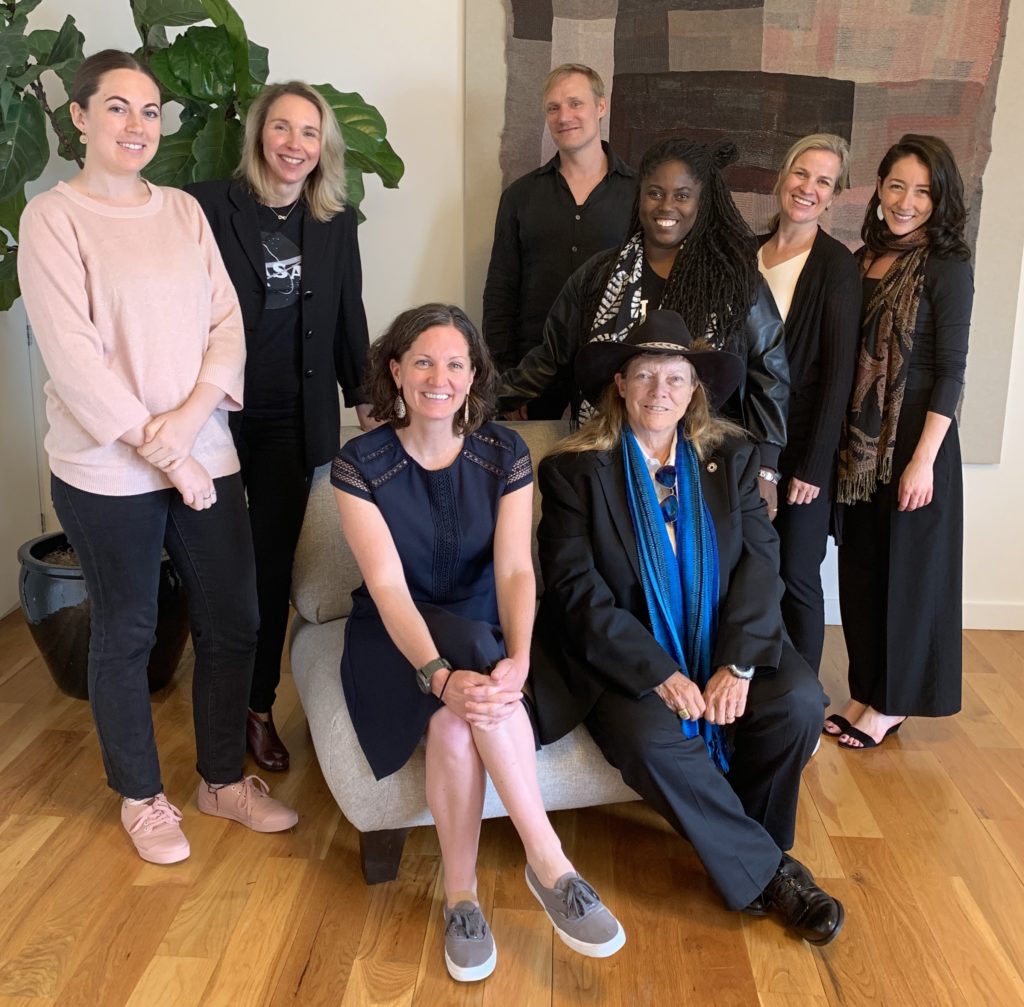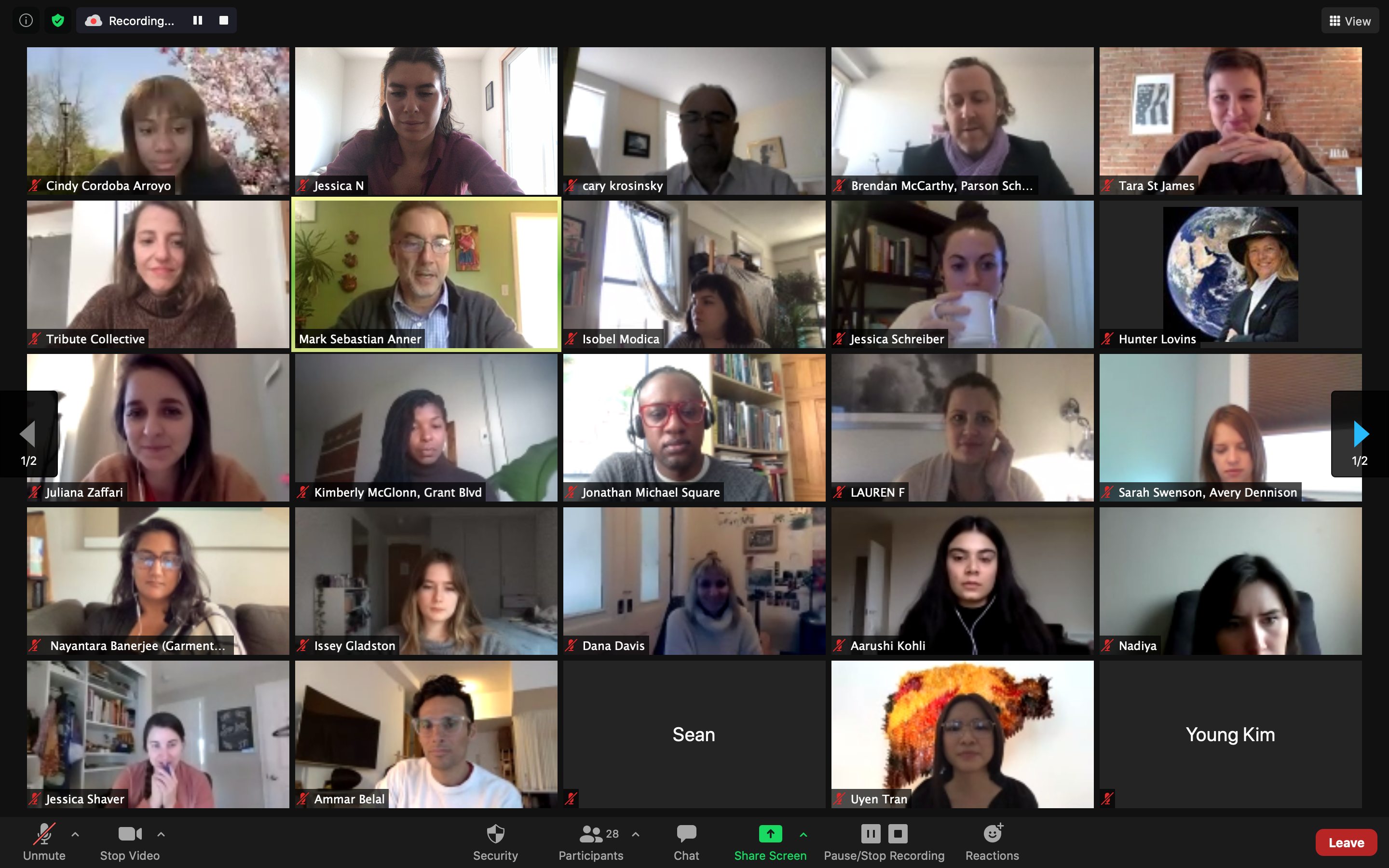The Role of Multidisciplinary Collaboration in Circularity
By Jessica NeJame & Lauren B. Fay, The New Fashion Initiative
In order for sustainability and circularity solutions to be successful, they must be 1.) multidisciplinary 2.) multigenerational, and 3.) centered on deliverables. Sustainability is a complex issue with many stakeholders. Meaningful solutions require a multitude of voices working towards a common goal. While going online due to COVID-19 has been challenging in many ways, it has also proven the capacity of technology to provide a bridge between companies and continents. The New Fashion Initiative’s Academic Consortium program is a case study in multi-stakeholder collaboration and the many benefits it can have for research, brands, and academia.
TNFI Academic Consortium
The fashion industry is inherently multidisciplinary, incorporating design, business, labor rights, marketing, etc. However, best practices are often siloed within subfields and between academia and brands. Many proposed industry changes capture only a small piece of a complex puzzle, leaving many questions unanswered and reducing the efficacy of these ideas. For example, chemical recycling is taking off in the US. It is an important end-of-life strategy but addresses only that one element. Current conversations about this technology do not incorporate questions like: How can designers adapt their work to support circular textile innovations? How can professors prepare future leaders for working with this new technology? Where will chemical recycling facilities be located, and will those facilities have disproportionate impacts on historically marginalized populations?
If solutions aimed at making the industry more sustainable and just are to be truly effective, they must be 1.) multidisciplinary 2.) multigenerational and 3.) centered on deliverables. Programming like workshops and events will greatly benefit from the inclusion of a diverse array of voices with experience in various relevant subfields.
The New Fashion Initiative’s Academic Consortium program aims to put these beliefs into practice. Our organization provides a platform for developing collaborative research, projects, and solutions to major sustainability and ethical challenges of the fashion industry. As a case study, this program proves how impactful circularity programming can be when it is 1.) multidisciplinary 2.) multigenerational and 3.) centered on deliverables.
The Academic Consortium is a two-fold program. Phase one is in-person and virtual workshops to introduce diverse industry leaders to each other’s work, providing attendees with a broad swath of new ideas and developments across every aspect of the fashion industry. The event is multidisciplinary, as we bring together leaders in environmental finance, design, textiles, labor rights, etc. It is also multigenerational. TNFI is committed to providing opportunities for emerging leaders, so post-graduate students are invited to apply to attend (selection is based on anonymous judging of student research by a panel of multidisciplinary fashion industry leaders). Finally, TNFI’s Academic Consortium program is unique because our success is based on what happens after the workshop. We provide space and time during the Consortium for attendees to brainstorm collaborative project and research ideas and our success is based on the actualization of these conversations.
Phase two of the TNFI Academic Consortium is the establishment of hubs of regional thought leaders. These hubs will be the fertile soil in which interdisciplinary ideas can take root - think of MBA students learning from MFA students and vice versa, researchers from different disciplines working side by side to help brands find new innovations, the development of interdisciplinary curricula, and more. One day, these hubs may even grow into regional Innovation Labs, providing an accessible space for researching fashion industry solutions.
As it stands, information about fashion and sustainability is siloed, with academics in sustainability MBA programs, design schools, and environmental science departments rarely communicating across disciplines. In the business world, sustainability leaders rarely speak to those in the university space. Bringing together these different areas of expertise is essential for developing both effective solutions and effective leaders.
As it stands, information about fashion and sustainability is siloed, with academics in sustainability MBA programs, design schools, and environmental science departments rarely communicating across disciplines. In the business world, sustainability leaders rarely speak to those in the university space. Bringing together these different areas of expertise is essential for developing both effective solutions and effective leaders.
The Initial Workshop
 On September 26, 2019, The New Fashion Initiative collaborated with Eileen Fisher to bring an impressive group of minds together for the first TNFI x EF Academic Consortium workshop. Attendees had different areas of expertise, ranging from sustainability consulting to higher education to investigative journalism. The group met in New York City and then traveled to Irvington, NY, where they were greeted by Eileen Fisher’s team. After some opening statements from TNFI team members and facilitators, attendees gave fifteen-minute presentations about their work with fashion sustainability in academia. Joelle Firzli and Elizabeth Cline, the TNFI facilitators, led the group in a roundtable discussion about what techniques have been successful in connecting with students and which topics students are finding the most compelling. They then directed the conversation to action steps and potential areas for collaboration amongst the attendees and their institutions. The group then toured Eileen Fisher’s facilities, after which they broke for lunch. Upon reconvening, there were presentations from attendees involved with fashion sustainability in the business sector. This was followed by another roundtable, which focused on how to bring academic and business expertise, data, and resources together.
On September 26, 2019, The New Fashion Initiative collaborated with Eileen Fisher to bring an impressive group of minds together for the first TNFI x EF Academic Consortium workshop. Attendees had different areas of expertise, ranging from sustainability consulting to higher education to investigative journalism. The group met in New York City and then traveled to Irvington, NY, where they were greeted by Eileen Fisher’s team. After some opening statements from TNFI team members and facilitators, attendees gave fifteen-minute presentations about their work with fashion sustainability in academia. Joelle Firzli and Elizabeth Cline, the TNFI facilitators, led the group in a roundtable discussion about what techniques have been successful in connecting with students and which topics students are finding the most compelling. They then directed the conversation to action steps and potential areas for collaboration amongst the attendees and their institutions. The group then toured Eileen Fisher’s facilities, after which they broke for lunch. Upon reconvening, there were presentations from attendees involved with fashion sustainability in the business sector. This was followed by another roundtable, which focused on how to bring academic and business expertise, data, and resources together.
The Virtual Workshop
Due to COVID-19, TNFI went online for the 2020 Academic Consortium. On November 20, 2020, The New Fashion Initiative collaborated with Eileen Fisher and Avery Dennison to convene our second Academic Consortium workshop. This year, we expanded our reach to include financial experts and post-graduate students. Via Zoom, attendees shared presentations about their work and then fielded questions. After a break for lunch, post-graduate students shared their work in small breakout sessions. Professors and brand representatives provided feedback and suggestions to aid in their research. After reconvening as a large group, the brand representatives shared how they are applying sustainable solutions to their business models. The day featured two roundtable sessions – one focused on sharing the post-graduate student work with the larger group and connecting the dots between professors, brands, and students, and the second focused on brainstorming collaborative projects to pursue post-Consortium.

Major Successes
In our post-Consortium surveys, attendees emphasized how much they enjoyed the interdisciplinary nature of the program and often cited the most successful part of the day as hearing from individuals working in different fields. The most common constructive feedback we received was that in the future, the participants would like more time to get to know each other, discuss ideas, ask questions, and establish action steps. Attendees enjoyed the experience and are enthusiastic about being in this interdisciplinary space.
The inclusion of post-graduate students was a surprise hit this year. The attending professors are readily volunteering their time to advise on theses and dissertations. Additionally, among professors and brands, there is a major interest in conducting case studies and research to develop new sustainability programs. By including emerging professionals who are still students, sustainability programming benefits from both a different perspective and an added opportunity for continued research.
Messages from Attendees:
“It was very helpful to understand the broader supply chain landscape, where sustainability and human rights intersect, and the needs and challenges students of different disciplines are facing.”
“I appreciated… that the focus was on sharing ideas and coming up with proactive solutions and not just talking... the guests really wanted to have real impact.”
“Considering the multi-dimensional nature of the concept ‘sustainability’, different people addressing different approaches to it was insightful.”
“Loved that you had the Garment Worker Center there - more of this perspective please!”
Conclusion
The future of circularity lies in multi-stakeholder collaborations. Folks who may have thought of themselves as competition are now working together to share innovations, conduct research, and build a brighter future. Successful circularity workshops and other forms of programming must be 1.) multidisciplinary 2.) multigenerational and 3.) centered on deliverables.
About TNFI
The New Fashion Initiative (TNFI) is a 501c3 non-profit creating interdisciplinary education and communications initiatives to promote circularity, collaboration, and accountability in fashion. We work directly with academics, designers, businesses, and other non-profits to bring sustainable solutions to a broken system. We are here to help key industry stakeholders collaborate, share research, and convene in order to effectively address systemic issues. TNFI supports current and future leaders to be positive agents of change.
 Jessica NeJame & Lauren B. Fay
Jessica NeJame & Lauren B. FayJessica NeJame is a Project Manager for The New Fashion Initiative. Her work is focused on the intersection of policy and sustainability as well as pro-environmental consumer choice. Lauren B. Fay is the founder and Executive Director of The New Fashion Initiative. Her work as a fashion Consultant has been featured in Glossy, The Wall Street Journal, WWD, Refinery29 & Sourcing Journal. She is also a former US Coordinator for Fashion Revolution.